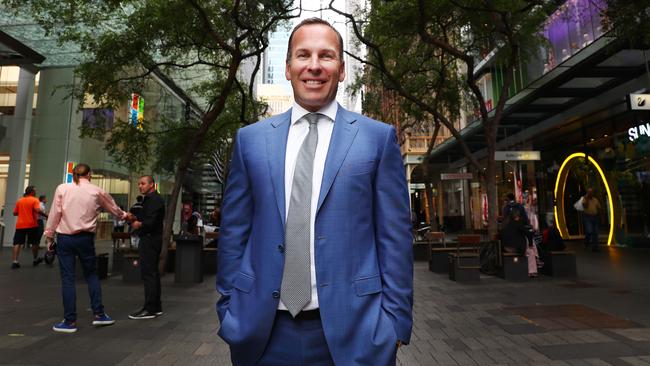Soul Patts’ Todd Barlow: Trend towards services a worry
Australia’s reliance on more volatile service-based industries has taken away the nation’s manufacturing heart, a top executive says.

Surging energy prices have sparked new risks to the economy as manufacturers curb activity and a reliance on more volatile service-based industries grows, Washington H. Soul Pattinson’s chief executive Todd Barlow has warned.
Mr Barlow told The Australian the nation’s shift towards service-based industries, and away from manufacturing, created problems when consumers “tightened their belts” and reined in spending on services.
“If you look at the rising price or cost of energy in Australia, it forces our economy to produce less things because the cost of production is too high … we have become a service-based economy and that is not a way that you would build a resilient economy,” Mr Barlow said.
“What concerns me about Australia is that resilience is gone.
“This trend towards services is a problem and it’s really taken away our manufacturing heart. I don’t see that trend reversing.”
WHSP — which pits itself as a value and long-term investment firm — has a $6.2 billion market capitalisation and its investment portfolio spans a range of sectors including natural resources, building materials, telecommunications, fiscal services, agriculture and corporate advisory.
Despite federal government posturing on energy prices and putting pressure on large industry players, Mr Barlow does not see an easy fix to the issue given Australia’s volume of LNG exports and limited gas extraction across several states.
Those concerns add to his overall cautious tone on prospects for financial markets and the economy, where he expects a slowing in growth.
“We’ve deliberately structured our portfolio away from assets that are tied to consumer sentiment and that are highly cyclical consumer businesses,” Mr Barlow added, highlighting factors such as high levels of household debt and falling property prices as exacerbating challenges in consumer industries.
“We continue to think there are reasons to be cautious.”
Treading carefully on its investments appears to be paying off, with WHSP’s shares having climbed about 52 per cent in the past 12 months. The group’s unlisted and listed investment portfolio value, pre-tax, amounts to $5.8bn.
The company’s large holdings in listed companies include TPG Telecom, coal group New Hope and WHSP sister company Brickworks. Given the New Hope investment, Mr Barlow remains upbeat on prospects for coal demand in the Asian region.
“The question on coal in Australia is very divided and it’s probably unlikely that we will see new investment in new coal-fired capacity in Australia, but our investment in New Hope has never been based on domestic coal supply,” he said. “The markets that we are interested in for coal are the Asian region because that’s where we can ship to and it is also where the demand is.”
WHSP, given its origins in the pharmaceutical business, still has an exposure to retail via a holding in the owner of Priceline, the ASX-listed Australian Pharmaceutical Industries.
Mr Barlow said API was also broadening its strategy away from just a retail presence to tap into skin and laser treatments.
On the issue of the mobile phone and data market, where the competition regulator has flagged issues with TPG’s proposed marriage with Vodafone Australia, Mr Barlow said the metrics underpinning the deal were compelling.
“Our view remains that it is a better outcome to create a stronger competitor” to Telstra and Optus, he said. “If it (the merger) doesn’t go through, it’s business as usual.”
WHSP’s investment philosophy also delves into demographic and other long-term trends such as future data usage and flows into superannuation.
That probably explains the company’s financial services exposure.
“Our initial thesis in financial services was simply the underlying growth in the superannuation assets. It will get through $9 trillion in 15 years time,” Mr Barlow said.
“Our view was that as each individual superannuation fund gets larger the effective cost of advice comes down, and the need for advice increases.
“We think there is a real need and a strong place for advice in superannuation in Australia, we just don’t know if it was done right in the past.”
WHSP has made a bigger push into financial services in the past five years. Its investments in the sector include a large holding in funds manager Pengana Capital, which was created via a merger with Hunter Hall, and a stake in Ironbark Asset Management.
It hasn’t always been smooth sailing for WHSP, particularly as it endured a multi-year battle with a key shareholder. In 2017, WHSP and Brickworks won the fight following a longstanding court case brought by Perpetual, which had argued a cross shareholding between the two companies was hurting minority shareholders. Mr Barlow admits the company in the past did not do a good enough job of being transparent and explaining its operations to investors.




To join the conversation, please log in. Don't have an account? Register
Join the conversation, you are commenting as Logout